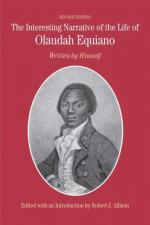|
This section contains 4,311 words (approx. 15 pages at 300 words per page) |

|
on Olaudah Equiano
Biography Essay
The wide range of eighteenth and nineteenth-century slave narratives—Anglo-African, French, Caribbean, North and South American, and Cuban—maps a long, diverse journey from slavery to freedom. The tradition roots twentieth-century Caribbean and black African writing, as well as black British and African American writing, in a creative tradition. Continuities have been noted from Olaudah Equiano (ca. 1745-31 March 1797) to nineteenth-century West African writers James Africanus Horton and Edward Wilmot Blyden, and to Chinua Achebe, who has described Equiano as his literary ancestor. The slave-narrative tradition contextualizes modern fictional treatments of slavery by locating them in a specific historical and literary context and by providing a precedent for telling about slavery from the point of view of slaves. Caryl Phillips's novels Higher Ground (1989), Cambridge (1991), and Crossing the River (1993) are indebted to the sense of detail, subject matter, and dominant themes characteristic of The Interesting...
|
This section contains 4,311 words (approx. 15 pages at 300 words per page) |

|


